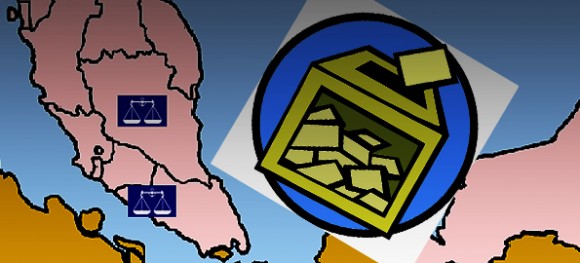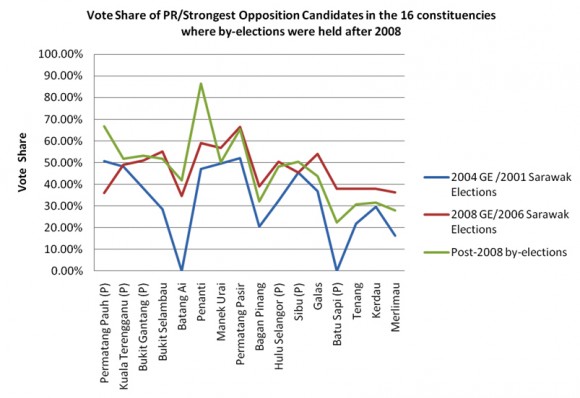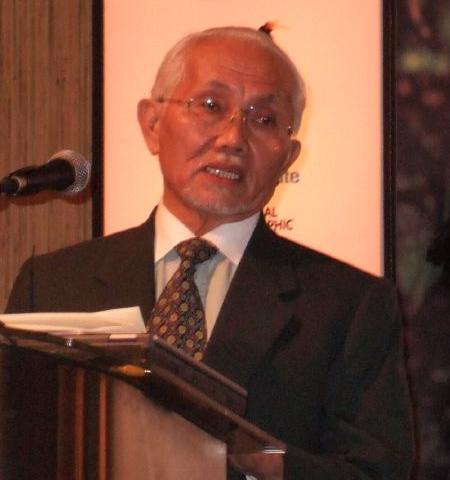THE Barisan Nasional (BN) has recently emerged triumphant from two by-election victories in Kerdau and Merlimau, its fourth and fifth consecutive victories so far. Prime Minister Datuk Seri Najib Razak has said the wins showed the people’s growing support for the BN.
Can these BN achievements be interpreted as such? And what does this mean for the Pakatan Rakyat (PR)’s chances of winning the next general election? The Nut Graph speaks to political scientist Wong Chin Huat.

TNG: How far can the BN’s victories in Kerdau and Merlimau be interpreted as a sign of the people’s growing support for the coalition since 2008?
Like Tenang, Kerdau and Merlimau are both Umno strongholds and therefore unrepresentative of the national picture. If you were to have a by-election in any of the MCA’s 15 parliamentary seats and 32 state seats, I am afraid the result would be embarrassing for the BN.
Everyone is treating the by-elections as mid-term elections, indicators of what’s to come in the general election. But by-elections in Malaysia are different from real mid-term elections which cover the entire nation, such as US congressional elections or UK local elections. Malaysian by-elections are subject to “sampling bias”. Instead of having 16 of them together, we had them in 12 rounds. This makes the sequence rather important. Winning first and losing later will be seen as declining support, while losing first and winning later will be seen as growing support.
This is not to say that we can’t read any trends from by-elections. But we must put them in perspective.
 Notes:
Notes:
1. 0% in Batang Ai (2001) and Batu Sapi (2004) indicates walkover by BN.
2. Constituencies in Sarawak were redelineated in 2006. Hence, the Sibu parliamentary constituency in 2004 and the Batang Ai state constituency in 2001 and 2006 were somewhat geographically different from now.
The chart above shows that the PR’s performance has been fluctuating between the 2004 and 2008 levels (2001 and 2006 for Sarawak). Overall, the PR’s support rate is still higher now than the 2004/2001 levels, even in Batang Ai, Bagan Pinang, Tenang, Kerdau or Merlimau, notwithstanding a clear decline from the 2008/2006 levels.
This means while substantial voters have returned to the BN, its support still has not reached its peak. Part of the “tsunami” swing has been retained by the PR.
Is this the end of the road for the Pakatan Rakyat as far as winning the federal government is concerned in the next elections, as some are claiming?
The PR’s fate will be determined by two factors: its performance in Sarawak, and how the parties respond to their recent electoral setbacks.
If the PR does well in Sarawak, say winning around 20 out of 71 seats even though falling short of one-third, it would mount pressure for Chief Minister Tan Sri Abdul Taib Mahmud to quit. It would also introduce uncertainty in how East Malaysians will vote in the federal elections. Sarawak would then be nobody’s fixed deposit. And if East Malaysians decide to go for change, the PR may still stand a chance to win a bare majority despite its declining support in the Malay heartland. That prospect will boost the PR’s confidence and induce unity.

However, if Sarawak turns out to be a big disappointment, say with the PR winning only around 10 to 12 seats (only a one to three-seat increase from 2006), despite the native customary land outcry and anti-Taib sentiment, it will have no chance of taking Putrajaya. This will induce PR politicians to consolidate their support in their communal strongholds, which may even lead to the PR’s disintegration should they do badly after the next general election.
The controversy over Kelantan‘s lottery ban, which emerged in the last days of the twin by-elections, is a bad sign. PAS is certainly facing an identity crisis with declining support in the Malay heartland. While Kelantan’s lottery ban is not new, the PAS Youth chief who staunchly opposed Valentine’s Day celebrations also called on other PR-held states to emulate Kelantan.
I am not sure how much Muslim support PAS can gain with his antics. But certainly this is causing unease among non-Malay Malaysian voters. The DAP went all out to help PAS in Tenang, even defending the PAS woman candidate’s practice of wearing gloves when shaking hands.
But a lottery ban that is justified with “we know what is best” is beyond what the DAP or any non-Muslim-based party can swallow. And if Chinese Malaysians hold back their support for PAS, which is already facing declining Muslim support, PAS may lose up to five parliamentary seats.
What about the PR’s chances of retaining the states they currently hold?
This depends on whether they hold state elections concurrently with the federal election. The states have the right to choose their own timing in dissolving their assemblies.
If federal and state elections are held concurrently, only Penang is 100% certain to be retained. Selangor’s likelihood of remaining in PR hands will be much higher than 50%. However, the same cannot be said about Kelantan, where PAS has lost two by-elections to date, and Kedah, where PAS is seen as another Umno by some disillusioned non-Muslim voters.
One problem with PAS is that it is losing young Muslims’ support. Is it because it is too pro-Chinese as portrayed by Umno, or too rigid in lifestyle issues? I think PAS knows the answer to that better than anyone.
However, if PR-held states have separate elections (unless the general election is delayed until late 2012 or 2013), they stand a good chance to retain all their states. If the BN does not fare as well as expected in the next general election, the PR can immediately dissolve their state assemblies to capitalise on that. If the BN does well, then they can wait until the “feel good” factors subside. One thing is for certain, it is almost impossible for the BN not to raise petrol prices after the general election.
Najib mentioned that non-Malay Malaysians are growing increasingly “fond” of the BN. What are your views on this?
Have a by-election in MCA-held seats and we will know how true this statement is.
What could be some of the reasons for the perceived stronger support for the BN recently? Is it the economy doing relatively well? The various government programmes such as the Economic Transformation Programme and the Government Transformation Programme? Najib trying to appear more inclusive? The demonisation of PAS to Chinese Malaysians and of the DAP to Malay Malaysians? Or all of the above?

All of the above. But, fundamentally, the PR has failed to show it is substantially different from the BN. Najib is positioning himself as the “reformist” within the BN, much like what Tun Abdullah Ahmad Badawi did from 2003 to 2004. To beat Najib, the PR needs to show either that substantial reform from within the BN is impossible or offer a superior alternative plan to transform the nation.
For rural Malay Malaysians, they still can’t see how the PR will advance their sectoral interests. For urban residents, the fact that the PR can’t even implement local elections creates the sense that all politicians are the same.
The PR’s inability to show sufficient changes to public life, as compared to Najib’s programmes, is partly structural as their state governments have little money and power to implement greater plans under Malaysia’s highly centralised federalism.
However, the PR needs to assume part of the responsibility, too. Where is Datuk Seri Anwar Ibrahim’s shadow cabinet? Who will be the key ministers if the PR takes Putrajaya? Nobody knows. That alone is enough to diminish the passion among some sophisticated voters.
It’s like the fairy tale The Frog Prince. The frog (Pakatan) needs the princess (voters) to kiss it to be transformed into a prince. But in reality, most princesses will kiss you only if you are already a prince. ![]()
Wong Chin Huat is a political scientist by training and a journalism lecturer by trade. If readers have questions and issues they would like Wong to respond to, they are welcome to e-mail editor@thenutgraph.com for our consideration.
Read previous Uncommon Sense columns


frog says
There are many frogs in Malaysian politics. They still survive without a princess.
kahseng says
PAS and DAP are hoping to get lucky without a strong, bridging PKR. […] This is probably the main reason they lose young Malay [Malaysian] support. Soon the Chinese will see that too.
kahseng says
While Umno understands this, PR does not.